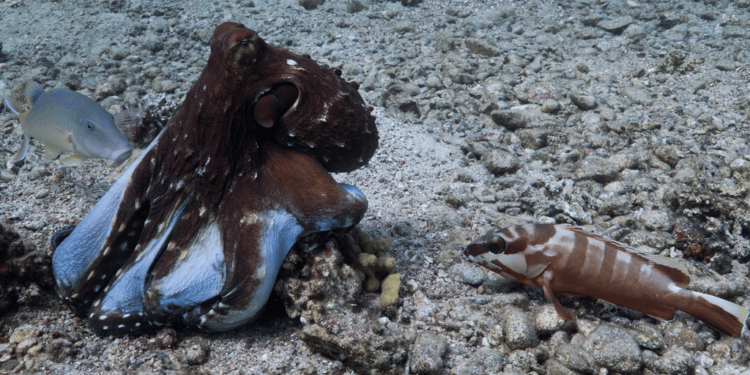Marine biologists have observed a crack squad of unlikely allies hunting together in the waters of the Red Sea. Big blue octopuses have been seen teaming up with goatfish and grouper to hunt down prey—a rare feat in the animal world. It’s one that’s even more surprising given that both the fish and the octopuses have another common prey: each other.
And while the octopus might be the most likely candidate for leading the hunt—given its intelligence and size—this latest research, published Monday in Nature Ecology & Evolution, shows that fish can take charge of these missions, too.
This new information contradicts previous thinking on the phenomenon and calls into question how rigid the categories of cooperative versus competitive hunting are.
Typically, big blue octopuses (Octopus cyanea) find food using a kind of hit-and-hope technique, dubbed speculative hunting. They’ll float along the reef, stopping often over crevices or rocks and splaying their legs outwards in the hopes of finding a crab, fish, or shrimp. They can do this up to once every seven seconds, said study lead author Eduardo Sampaio, a postdoctoral researcher at the Max Planck Institute of Animal Behavior in Germany. “It’s spending a lot of energy looking for prey. But what we see is that the octopus doesn’t have to put in this effort,” he told VICE.
What Sampaio and his colleagues saw is that when octopuses hunt together with groups of fish, the fish seek out prime hunting spots and signal for the octopus to come over, either by darting back and forth between the spot and the octopus, or by hovering over it.
“These fish function as an extended sensory system for the octopus. The octopus can basically sample or explore the environment just by watching them,” he said. The octopus will then splay over the target and feed. The fish, meanwhile, get the benefit of food being flushed out that they otherwise couldn’t reach.
Not only did Sampaio’s team observe these hunts during more than 120 hours of diving, they also tracked the interactions in three dimensions using a specialized stereoscopic rig. “We looked like Power Rangers in the water,” Sampaio said. This allowed them to quantify the interactions and show empirically that fish are not just followers, they can be leaders too.
They also conducted an experiment to see how much more successful octopuses were when helped by their fish friends. They set up cages that were either empty or full of food, and recorded how much time octopuses spent visiting them. When hunting alone, octopuses were equally likely to visit either the full or empty cage—but when paired with a school of fish, they almost always (95 percent of the time) visited the cage that was full.
But the fish-octopus relationship doesn’t always run swimmingly. This delicate cooperative balance can be thrown off if some individuals aren’t pulling their weight. For example, blacktip grouper fish are selfish: rarely helping to find new hunting sites but quick to capitalize on any available food. Sampaio’s team saw that octopuses weren’t quick to mete out discipline: when there were more blacktips in the mix, the octopuses would punch them out of the way.
And fish too would get antsy with each other, jostling for a prime spot in the hunting pack. “If you start having too much exploitation, the group doesn’t move to keep finding food. This starts to create aggression in the group because no one is getting rewards.” Sampaio said that this study shows that animal-animal interactions aren’t always purely cooperative or competitive: they exist on a continuum.
What’s more, the study highlights just how smart fish can be—a point that’s often overshadowed given how popular displays of octopus intelligence have been in recent years. “It’s not necessarily that the octopus is the smartest in the group because these fish are also leading the octopus,” Sampaio explained. “When you’re cooperating with another animal you have to constantly be taking into account its behavior now and its behavior before. This creates a hard scenario that requires a certain amount of cognition.”
But of course Sampaio doesn’t discount the octopus’s smarts, either. These animals are normally solitary creatures, so they have no friends within their own group to learn these social interactions from. They think it’s learned from their dealings with the fish.
The next step for Sampaio and his team is to better understand how these vastly different organisms—separated by around 550 million years of evolution—communicate with one another. For example, Sampaio thinks that before throwing out their punches to keep the group in line, octopuses may be changing color as a kind of warning.
They also want to see whether the same individuals team up more often, or if the groupings are random. If it’s the former, it would represent another great shakeup in our understanding of animal cognition because it would require individuals to recognize and remember each other. “We basically want to understand how complex these interactions really are,” said Sampaio.
Follow Mirjam Gesguen on X.
Related: Could This Deep-Sea Isopod’s Algae Fetish Help Reverse Climate Change?
The post Fish Are Leading Octopuses On Collaborative Hunting Missions, Red Sea Scientists Find appeared first on VICE.
The post Fish Are Leading Octopuses On Collaborative Hunting Missions, Red Sea Scientists Find appeared first on VICE.



















